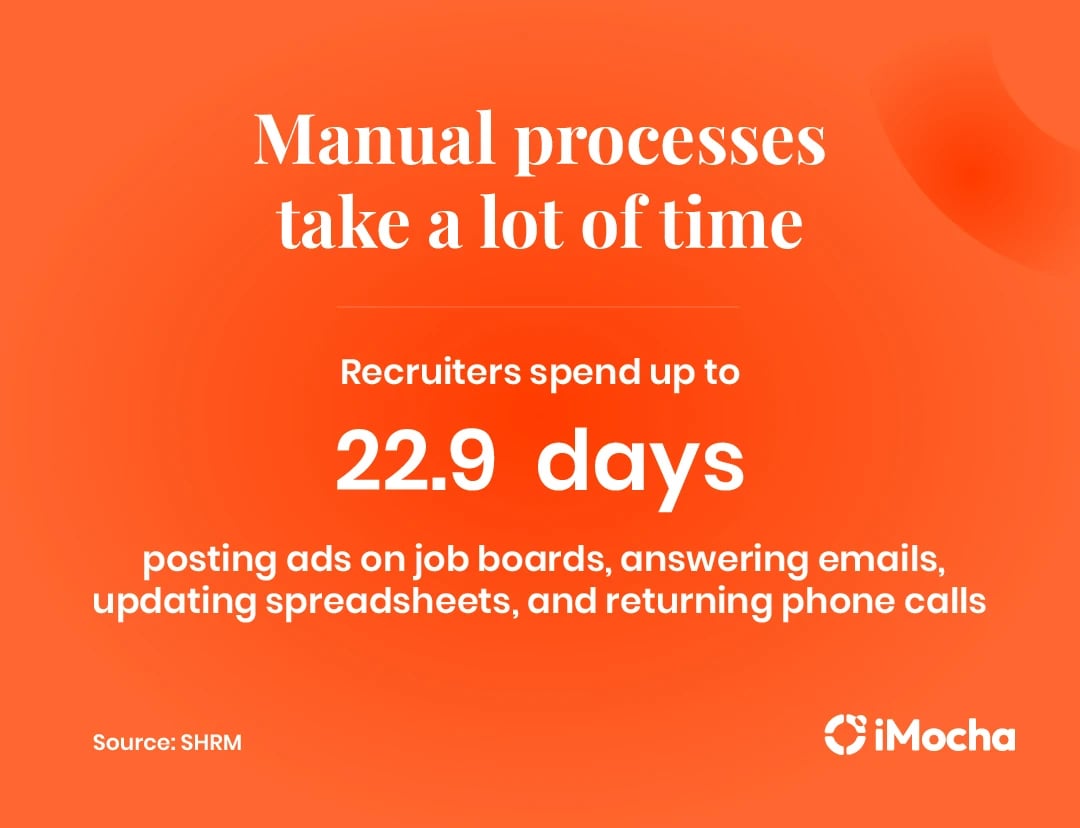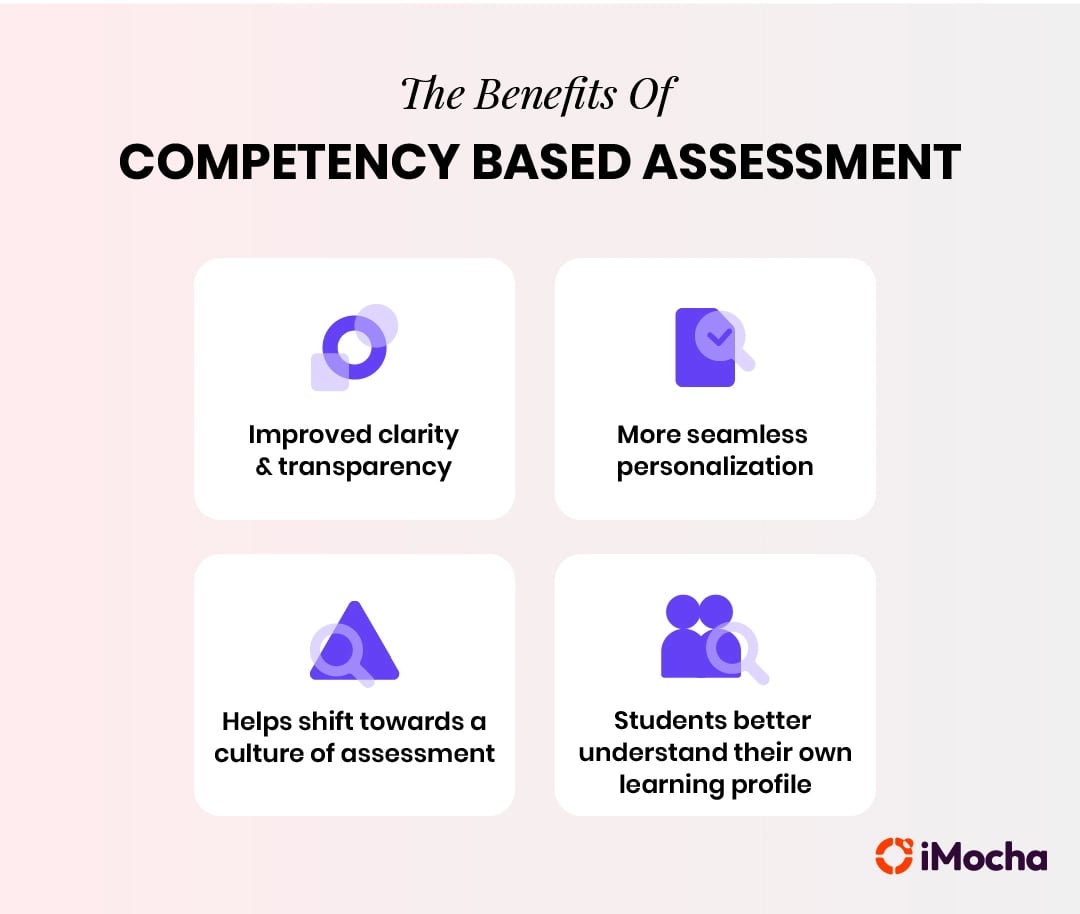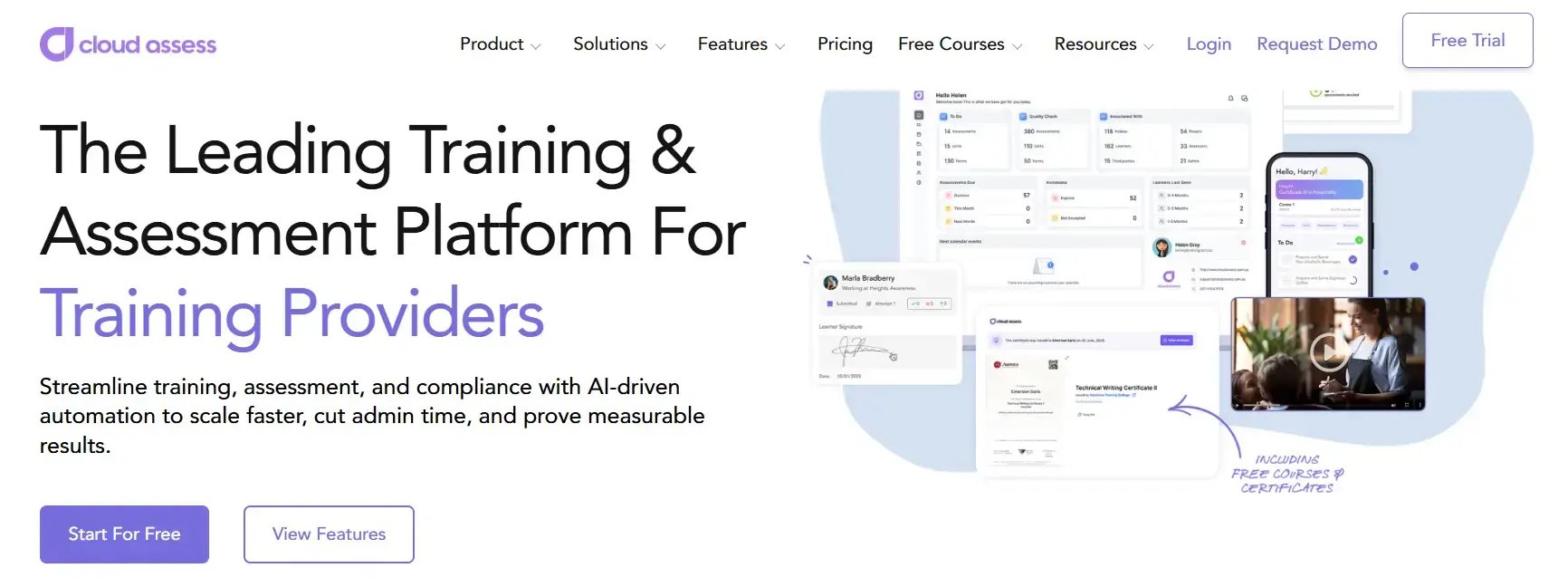Struggling to identify specific skill gaps in your employees? Looking for ways to improve your hiring decisions? Wondering how to choose who is ready to upskill and take on new responsibilities?
The answer lies in implementing a Competency Assessment Tool to digitize your evaluation process. Manual competency assessments are outdated and riddled with challenges:
- Accurate skills gap analysis becomes virtually impossible
- Unconscious bias can affect hiring and development decisions
- Matching candidates to specific roles proves difficult
- Creating personalized learning paths is extremely time-consuming
- Setting meaningful employee goals without detailed skills insights is challenging
A Competency assessment software solves these problems by streamlining talent development and providing data-driven insights for better decision-making.
|
Looking for the right tool to perform skills-gap analysis? Try iMocha's skills assessments and identify employee skills gaps in real-time |
 What is a competency assessment tool?
What is a competency assessment tool?
A competency assessment tool is a digital solution designed to evaluate and document an individual’s proficiency across job-specific skills, behaviors, and knowledge areas. By comparing actual competencies against predefined benchmarks, it helps organizations identify skill gaps, track development progress, and make informed decisions in hiring, promotions, and learning initiatives.
Let's understand this better by enlisting the benefits of an ideal competency-based assessment tool:
- It helps you evaluate strengths and weaknesses across your workforce
- Supports employee growth and empowerment
- Eliminates unconscious bias
- Help you create a team of qualified professionals that enable growth
- Analyzes individual performance against future job prospects
- Offers the flexibility to assess employee competency against ad-hoc requirements
- Provides individual and aggregate reporting capabilities

|
Table of contents 1. iMocha - Best AI-powered competency assessment tool for skills-based hiring 2. TalentGuard - Best for competency-based career pathing 3. Pointerpro - Best for customizable assessments and automated reporting 4. Mettl - Best for versatile skills testing and proctoring 5. eSkill - Best for customizable industry-specific competency tests 6. Intervue - Best for technical interviews with live coding 7. Skillrobo - Best for pre-employment testing and candidate skill evaluation 8. Cloud Assess - Best for practical, hands-on skills validation 9. Unstop - Best for business simulation and gamified assessments 10. Vector Solutions - Best for compliance and training-based assessments |
Top 10 Competency Assessment Tools (2026)
1. iMocha
iMocha is an advanced, AI-powered competency assessment and skills Intelligence platform built to support skills-first hiring, workforce planning, and talent development. It enables organizations to identify, validate, and benchmark skills with precision through its comprehensive suite of assessments and analytics.
Key Features:
- 3,000+ skills assessments across technical and non-technical domains
- AI Skills Match to align talent with job-role requirements
- AI-based proctoring (video, audio, image) for test integrity
- Real-time skills gap analysis for workforce planning
- Actionable skills analytics and benchmarking reports
- Seamless integration with leading ATS and LMS platforms
Pros:
- Wide Range of Assessments: iMocha provides a diverse set of assessments covering technical skills, including programming languages, data structures, and algorithms. Its extensive library of skills is beneficial for customizing tests based on specific client needs.
- Cheating and AI Use Detection: The platform helps in detecting cheating and the use of AI during assessments, ensuring test integrity. Video and image proctoring are great features.
Cons:
- Dashboard Usability & Customization: Some users mention that the employer dashboard could be more user-friendly. Creating a test from scratch can be time-consuming.
G2 Rating: 4.4/5 (276 Reviews)
Pricing: Visit iMocha's pricing page for more details.
|
Worried about bad hiring? Use iMocha's digital skills assessments to map candidate competencies with the right job role! |
2. TalentGuard
.webp?width=1600&name=MicrosoftTeams-image%20(64).webp) TalentGuard offers SaaS-based competency assessment software that allows human resources teams and recruiters to engage and retain employees. It helps you improve business outcomes by providing an extended network of credentialed career coaches, training programs, and content.
TalentGuard offers SaaS-based competency assessment software that allows human resources teams and recruiters to engage and retain employees. It helps you improve business outcomes by providing an extended network of credentialed career coaches, training programs, and content.
Features:
- Automate performance management
- 360-degree feedback
- Career pathing
- Succession planning
- Individual development planning and certification
Pros:
- User-Friendly Interface: Intuitive design reduces training time and streamlines HR processes. Employee-centric dashboards enhance management.
- Comprehensive Talent Management: All-in-one platform for performance management, career pathing, and succession planning. Supports certification and skills tracking.
Cons:
- Limited Reporting: Lacks depth for advanced data analysis, which may hinder strategic decision-making.
- Customization Challenges: UI and workflows may not be as flexible as competitors, making customization complex.
G2 Rating: 4.6/5 (4 reviews)
3. Pointerpro
.webp?width=1600&name=MicrosoftTeams-image%20(65).webp) Pointerpro allows you to create online assessments that automatically generate personalized reports upon completion. Whether you want to scale your business, generate leads, or save time through automation, Pointerpro simplifies all these processes. It reduces barriers to completion and provides assessment templates with questionnaires that are mobile-optimized for smartphones and tablets.
Pointerpro allows you to create online assessments that automatically generate personalized reports upon completion. Whether you want to scale your business, generate leads, or save time through automation, Pointerpro simplifies all these processes. It reduces barriers to completion and provides assessment templates with questionnaires that are mobile-optimized for smartphones and tablets.
Features:
- Real-time reporting
- Identifies competency gaps
- Allows you to set performance standards
- Multi-user management and collaboration
- Improves recruitment efforts
Pros:
- Advanced Reporting: Strong data analysis tools with secure PDF generation for easy sharing.
- Highly Customizable: Allows branded questionnaires and dynamic question paths with conditional logic.
Cons:
- High Cost: Expensive, with extra charges for features like PDF generation.
- Limited E-sign Features: Basic functionality may not meet advanced signature needs.
G2 Rating: 4.5 /5 (165 Reviews)
4. Mettl
Mettl is a cloud-based competency assessment software that helps organizations evaluate talent across technical, cognitive, behavioral, and domain-specific skills. It supports hiring, learning and development, and employee benchmarking with secure, scalable, and customizable assessments.
Features:
- Technical and non-technical test library
- Custom test creation
- AI-based remote proctoring
- Coding simulators
- Real-time analytics and skills gap reports
Pros:
- Diverse Assessment Library: Supports technical, behavioral, and domain-specific evaluations.
- Strong Security: AI-based remote proctoring ensures secure online assessments.
Cons:
- Complex Onboarding: Wide scope of features may require additional training.
- Pricing Transparency: Detailed pricing not readily available; requires contact with sales.
G2 Rating: 4.4/5 (505 Reviews)
5. eSkill
eSkill is a pre-employment and employee assessment platform that enables organizations to measure candidate competencies through job-relevant tests, simulations, and behavioral assessments. It supports customizable testing across industries including healthcare, retail, finance, and customer service.
Features:
- Role-based assessments and simulations
- Video interview integration
- Behavioral and cognitive tests
- Custom question bank creation
- Real-time scoring and reporting
Pros:
- Industry Versatility: Offers assessments tailored for a wide range of job roles and sectors.
- Customization Options: Create role-specific tests using your own questions or eSkill’s library.
Cons:
- UI Limitations: Interface may feel dated compared to newer platforms.
- Pricing Access: Requires contacting sales for detailed pricing information.
G2 Rating: 4.5/5 (341 reviews)
6. Intervue
Intervue is a specialized technical assessment platform that revolutionizes the hiring process by offering interview outsourcing capabilities and real-time coding evaluations. Their unique approach can reduce the hiring cycle from 30 days to approximately 5 days by connecting organizations with experienced engineers who conduct and evaluate technical interviews.
Key Features:
- Interview outsourcing to technical experts
- Comprehensive interview recording and logging
- API integration capabilities
- Detailed performance analytics and reporting
- Custom assessment workflows
Pros:
- Efficient Live Interview Process: It facilitates live coding assessments without requiring candidates to install any software, streamlining the interview process.
- Time Savings: The platform can significantly reduce the time-to-hire, from approximately 6 weeks to 3 weeks
Cons:
- Programming Language Limitations: There may be limitations in programming language coverage. For example, VB.Net was previously available but removed due to issues.
- Question Bank Size: The "Question Bank" might be small and lack support for questions related to newer technologies like Flutter or Scala
G2 Rating: 4.1/5 (5 reviews)
7. Skillrobo
Skillrobo is a comprehensive competency assessment platform that helps organizations identify candidates' advancement potential through detailed evaluation of their current abilities, qualifications, and skill gaps. The platform stands out for its ability to minimize hiring bias while supporting both recruitment and employee development initiatives.
Key Features:
- Extensive assessment library for various skills
- Employee development tracking
- Team competency mapping
- Performance prediction tools
- Real-time assessment monitoring
Pros:
- Time Savings: SkillRobo saves time by automatically generating skills and tests using AI, streamlining the assessment creation process.
- Cheating Prevention: It offers a secure platform with reliable webcam monitoring to ensure test integrity, enhancing fairness in testing.
Cons:
- AI Limitations: The AI-powered bot's capabilities are limited to its current programming, which may restrict the generation of specific or advanced skills and tests.
- Privacy Concerns: Candidates may have privacy concerns due to the comprehensive monitoring and webcam usage during tests.
G2 Rating: 4.8/5 (4 reviews)
8. Cloud Assess
Cloud Assess is a mobile-first, cloud-based platform designed for training, assessment, and workforce competency management. It’s particularly effective for industries requiring hands-on skills validation, compliance tracking, and operational readiness.
Features:
- AI-powered assessment creation
- Custom practical and theory-based assessments
- Skills matrix and gap analysis
- Compliance tracking and certification
- Reporting and analytics
Pros:
- Versatile Assessment Delivery: Supports online, offline, and blended modes for practical learning.
- Compliance Tracking: Built-in tools for certifications, audit trails, and reporting.
Cons:
- Setup Time: Initial configuration may be time-consuming for complex workflows.
- Reporting Limits: Advanced analytics may be restricted in lower-tier plans.
G2 Rating: 4.8/5 (40 reviews)
9. Unstop Unstop is an AI-powered competency assessment platform that combines MCQs, coding challenges, business simulations, and gamified tests to evaluate technical, behavioral, and cognitive competencies. It supports large-scale hiring and campus recruitment with secure proctoring and real-time analytics.
Unstop is an AI-powered competency assessment platform that combines MCQs, coding challenges, business simulations, and gamified tests to evaluate technical, behavioral, and cognitive competencies. It supports large-scale hiring and campus recruitment with secure proctoring and real-time analytics.
Features:
- Business simulation and gamified assessments
- Coding, aptitude, and communication skill tests
- AI-based test creation
- 360° remote proctoring
- Real-time dashboards and performance reports
Pros:
- Diverse Assessment Formats: Includes coding, MCQs, simulations, and gamified tests to suit various roles and industries.
- Strong Proctoring Tools: Offers facial recognition, browser tracking, and real-time monitoring to ensure test integrity.
Cons:
- Setup Time: Simulation and gamified test creation may require more time compared to standard tests.
- Learning Curve: New users may need time to explore the full feature set effectively.
G2 Rating: 4.3/5 (14 reviews)
10. Vector Solutions
Vector Solutions offers a competency assessment software integrated into its LMS platform. It supports skill validation, compliance tracking, and workforce development, particularly for high-risk and safety-critical industries.
Features:
- Pre and post-training assessments
- Auto-assigned training based on results
- Custom training paths
- Competency tracking and reporting
- Integration with onboarding and compliance workflows
Pros:
- Compliance-Focused: Ideal for industries requiring strict safety and compliance standards.
- Automation-Ready: Automatically assigns training and tracks employee competency.
Cons:
- Add-on Setup: Some features may require enabling or additional configuration.
- Initial Setup: Custom training paths may take time to configure effectively.
G2 Rating: 4.5/5 (18 reviews)
| Discover the importance of employee competency assessments and how they streamline talent management and drive growth. |
Conclusion
Competency assessment tools help organizations evaluate employee capabilities against specific job-role requirements. They enable accurate skills gap analysis, reduce bias in hiring, and support personalized learning and development initiatives.
iMocha provides real-time visibility into workforce skills, enabling data-driven decisions for hiring, upskilling, and succession planning. These tools ensure that every talent decision, whether it is hiring, promotion, or development, is based on verified skills, not assumptions.
Also read: Top 20 Online Hiring Tools
|
Want to know more on how iMocha can help you measure employee and candidate competency? Schedule a demo today! |
Frequently Asked Questions
Which industry makes the most use of Competency Assessment Tools?
Industries like healthcare, finance, IT, manufacturing, and education rely heavily on competency assessment tools to evaluate skills and ensure compliance.
How do you create a competency assessment?
Start by identifying the key competencies needed for a role. Define measurable benchmarks for each, then design assessments to evaluate employee performance against those benchmarks. Use the results to identify skill gaps and tailor development plans accordingly.
What are the methods of competency assessment?
Common methods include self-assessments, manager evaluations, peer reviews, 360-degree feedback, skill-based tests, behavioral interviews, and on-the-job observations. These approaches help evaluate both technical and soft skills and can be used individually or in combination for a more complete view of employee capabilities.

